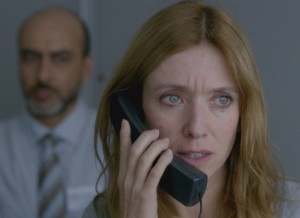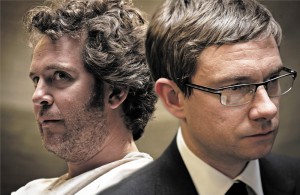Every year, the works chosen for the three Academy Award categories for short films are among the most overlooked of the year’s Oscar selections. Aside from those usually coupled with Pixar films and the rare popular YouTube short, the majority of pieces go on unseen and unheard of by the general public. Yet, for each of the shorts chosen as selections for the highest honor available in the field of films less than 40 minutes in length, the recognition alone puts their extremely varied storylines and styles into history.
This year’s nominees don’t come up short, with a wide array of talent on display from countries around the world. For those fortunate enough to see them, the nominees for Best Live Action Short Film and Best Animated Short Film will be released for packaged viewing on Friday, with the nominees for Best Documentary Short Subject to follow on February 14. The Daily Bruin A&E;’s Tony Huang and Sebastian Torrelio look at the shorts nominated for the two former categories, analyzing each piece’s shot at a big victory come the Academy Awards on March 2.

‘Do I Have to Take Care of Everything?’
Directed by Selma Vilhunen
The slightest of the nominees is Finland’s entry, “Do I Have to Take Care of Everything?” – but it might be the best. A whimsical tale of members of a family trying – and mostly failing – to make themselves presentable for a wedding, the story at first looks like a farcical delineation of a mother’s burden. But its empathy extends further than expected – the lackadaisical, lazy husband is never demonized, and the film skirts along at such a confident pace that the absurdist ending only feels slightly too cute.
In a competitive slate filled with serious films, it’s refreshing to see a film about human beings that is free from the constraints of a message. Small observations and offhand camera movements embroider the film’s edges with evidence of creativity, and it manages to be heartwarming despite being mostly about a disastrous day.

‘Helium’
Directed by Anders Walter
Denmark’s entry, “Helium,” is a crowd-pleaser whose appeal rests on the clarity and conventionality of its message. It follows a janitor at a hospital who becomes attached to a dying, blimp-obsessed child, Alfred, who may or may not remind the janitor of his brother. The janitor spins tales about a magical land called HELIUM, a substitute for Heaven, that consoles Alfred as death nears.
Fantasy sequences accompany the janitor’s tales about HELIUM. Everything happens as expected, and the film ends on the usual bittersweet note. It’s a spectacularly ordinary weepie, sure to have a long shelf life with audiences given to emotion, but for the jaded it poses no challenges. Competently crafted, sincerely felt and decent enough to watch, it’s nevertheless easy to see the template for “Helium” and how it was filled in. The unkind might call it cliche.

‘Just Before Losing Everything’
Directed by Xavier Legrand
France’s entry, “Just Before Losing Everything,” is a domestic psycho-thriller concerning a woman trying to take her kids away from an abusive husband. The central plot point is actually kept hidden for a good portion of the film, although it’s not hard to guess, given the frenzied and serious way the actors play their roles. But the ambiguity, at least at first, lends the film a rather pleasing mysteriousness, especially when the daughter gives an incredibly passionate good-bye kiss to her boyfriend during what we assume is just a normal pick-up from school.
Unfortunately, the seriousness of the premise creeps in, and while the film never plunges into unhinged drama, it does become less and less distinctive as it nears its conclusion. That said, “Just Before Losing Everything” is reasonably gripping, and much more assured as a film then any of the other shorts. And a great ending is worth a lot.

‘That Wasn’t Me’
Directed by Esteban Crespo
Spain’s entry, “That Wasn’t Me,” belongs to that inexplicably popular genre of films whose sole purpose is to prove definitively man’s inhumanity to man. Following a trio of doctors venturing into a war-torn environment, the film ostensibly aims for realism, using the all-too-familiar shaky-camera style to conjure the impression of nitty-gritty verisimilitude.
The film is not, however, above using drama as manipulation, nor could you call it unsentimental; the central conflicts are staged to squeeze out maximum horror, and the framing device reminds the audience that shedding tears over these happenings is indeed the correct reaction. The juxtaposition of a high-minded purpose (no one will deny that war is inhumane) and rather auto-piloted stylistic choices make “That Wasn’t Me” the kind of film that conjures up more questions about ethical aesthetics than about humanity.

‘The Voorman Problem’
Directed by Mark Gill
“The Voorman Problem” is the United Kingdom’s entry, starring the forever nonplussed Martin Freeman against an excellent Tom Hollander as the titular character. Adapted from a novel, it’s more premise than film – it ends just when it’s getting good. But the premise itself is fun: Voorman, a patient in a psychiatric ward, claims to be a god. Freeman, as a doctor, goes to examine him and the question, of course, is whether there’s any truth to the claim.
Probably the most philosophical of the live action shorts – though it’s less interested in wisdom and more in mind games – it ultimately feels shallow despite its excursions into intellectual territory. But it’s Freeman’s anguished face that anchors the film, a shallow pleasure that defeats resistance.
